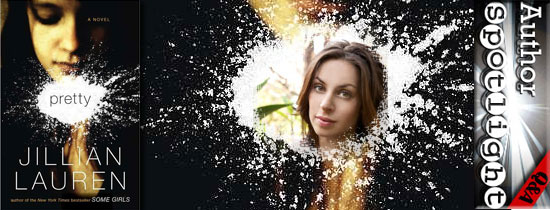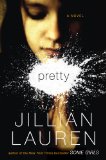Author Jillian Lauren was recently in town for the Booty Call Reading Series and to promote her novel Pretty. It chronicles Bebe Baker’s journey as she struggles to come to terms with her boyfriend’s death and her own addiction. Bebe is an ex-stripper, ex-Christian, ex-drug addict and ex-pretty girl. It is a gut-wrenchingly honest story, but somehow still manages to be full of hope and insight.
PBR: Pretty begins with a horrible accident where the main character Bebe is scarred. Why did you start there?
Lauren: How to start something and how to end something is always an incredible challenge. But it’s good to always start at the bottom – start with the damage. The scars are a metaphor for irreversible damage and the things we do that we can’t take back. The book is about Bebe’s journey in learning how to live with that damage and how to have a life where that stuff is present, where you’re not sweeping it under the rug but, nor are you owned by your poor choices and your traumatizing experiences.
PBR: Bebe’s journey is painful, but I was really rooting for her. She was a very sympathetic character. Who is Bebe?
Lauren: Bebe is a survivor. She’s a lot less fragile than she appears. She’s always walking that tightrope between surviving and completely self-destructing. We root for her because of her humanity and because of her flaws.
PBR: What is the central theme of Pretty and why did you choose it?
Lauren: If I had to pick one theme, I would probably pick faith. That is tied in with addiction, with loss, with memory, with being haunted by our pasts, and with our relationship to physical beauty as women in this culture. I am someone who struggles with faith, and issues of spirituality have always been really central for me. I was brought up Jewish and I’ve always had a fascination with Christianity. So making Bebe an ex-Christian, someone who has lost their faith, allowed me to explore this world in the realm of fiction. I was able to kick around my own issues of faith, which sometimes have something to do with Jesus and sometimes don’t. It gave me a chance to do a lot of research so I could present this in an accurate way. I spent a lot of time with Pentecostal Christians in Los Angeles and was very moved. I didn’t resolve anything, but I so treasure the time for the chance I had to at least clarify the questions.
PBR: Bebe struggles with addiction, recovery, redemption, and self-destructive tendencies. Is Bebe expressing your own struggles?
Lauren: Yes, particularly the drug and alcohol addiction. It’s something that I have battled my whole life, but I’ve been in recovery for 11 years. So it’s close to my experience and close to my heart. In order for struggles of addiction to speak to you, you don’t have to have a classic drug or alcohol addiction. This is a very addictive culture. There’s a very compulsive rhythm to how we go about life these days, whether it’s the internet or consumerism or sex or food or money. I think that it’s relevant on a universal level.
PBR: Why did you call your book Pretty?
Lauren: I liked it as a word because it has a lot of different meanings and I think it relates to the book on many of its layers. First of all, here’s this woman whose attractiveness in the conventional sense became a commodity in her life. She was working as a stripper before her accident. When that was taken away, she had to define her worth in a different way and that is one of the central struggles of the book. Then, there’s also the fact that she’s in beauty school.
PBR: How did you know so much about beauty school? The scenes at the school seemed so spot-on.
Lauren: I went to beauty school when I was in early recovery. I was looking for a day job so that I could write and so that I could support myself in a way that was respectable. It was much like it is in the book. It was boring and it was awful but the people around me were so fascinating that I would sit there and take notes. I was listening to what people were saying. I attended for a year and I’m a proud owner of a cosmetology license.
PBR: The role of Billy almost seems like the alter-ego of Bebe, like he’s the voice inside of her head. He’s so dark and he’s trying to bring her down.
Lauren: Yeah, I hadn’t thought of that, but he is sort of the devil. He is that traditional character which is, of course, the voice inside of all of us.
PBR: All your characters are very nuanced and three-dimensional. I was especially impressed by Jake who is mentally ill. Where did he come from and why was Bebe attracted to him?
Lauren: That character is based on a friend of mine who is mentally ill and who is so brilliant, charming, charismatic, and who has a military history. I did a lot of interviews with him when I was writing that character. I also researched schizophrenia, so I did my academic research because this person inspired me. So, Bebe wanted to save him, she wanted him to save her. I think what is broken in her and what is also this deep belief in redemption was like a magnet to what was broken in him.
PBR: How did you come up with the scene in The Ambassador with the reference to R.F.K.’s assassination?
Lauren: I was fortunate to have been there when I was working on a music video. I took off and went exploring by myself and was completely taken by the magic of the place. They were knocking it down as I was writing this book. I would drive by it and it just broke my heart, so I wanted to memorialize it.
PBR: What would you like your readers to take away from Pretty?
Lauren: I would like them to walk away with a respect for Bebe’s journey and their own journey. To value that process, the struggle. I think you come to the end of this book and don’t find any answers. I certainly didn’t as the writer, so I don’t expect the reader to, but I do feel like there is a hope that’s offered. That’s the take away that I’d like people to have. Like the Buddhist idea that the answer is the question and the journey is the destination.
 Jillian Lauren is the author of the New York Times bestselling memoir “Some Girls: My Life In a Harem” which told the story of how a nice girl from the suburbs ended up in a harem in Brunei. She has an MFA from Antioch University and lives in Los Angeles with her husband, Weezer bassist, Scott Shriner.
Jillian Lauren is the author of the New York Times bestselling memoir “Some Girls: My Life In a Harem” which told the story of how a nice girl from the suburbs ended up in a harem in Brunei. She has an MFA from Antioch University and lives in Los Angeles with her husband, Weezer bassist, Scott Shriner.


